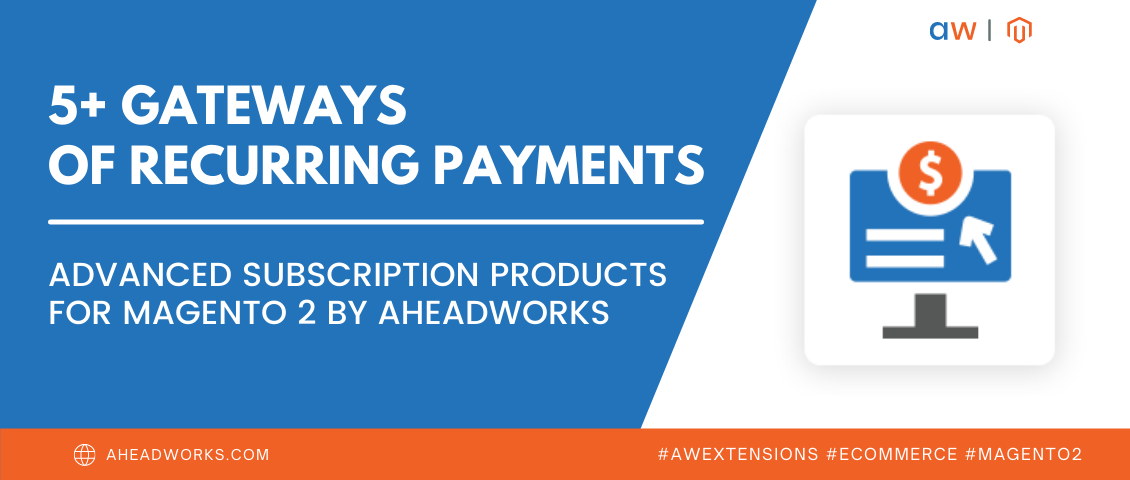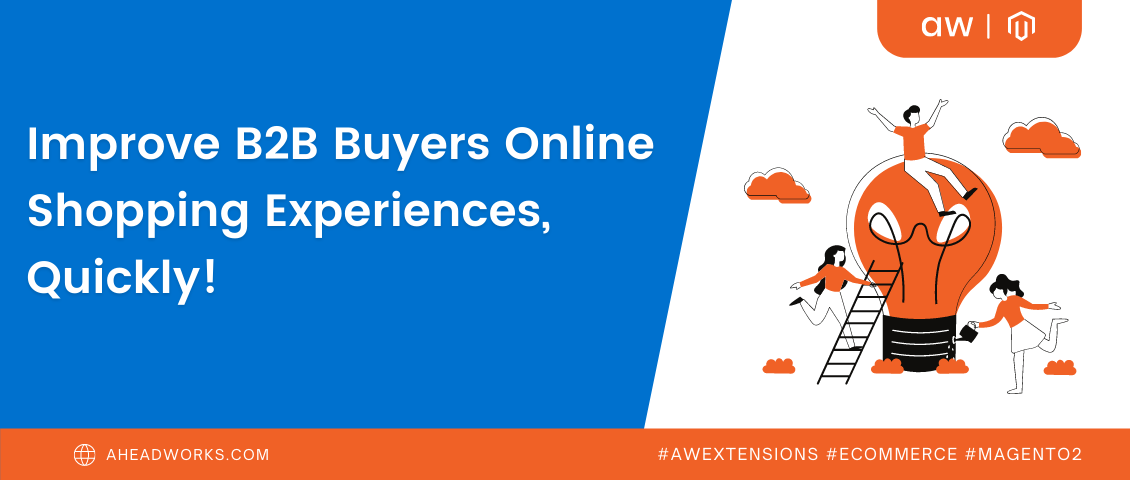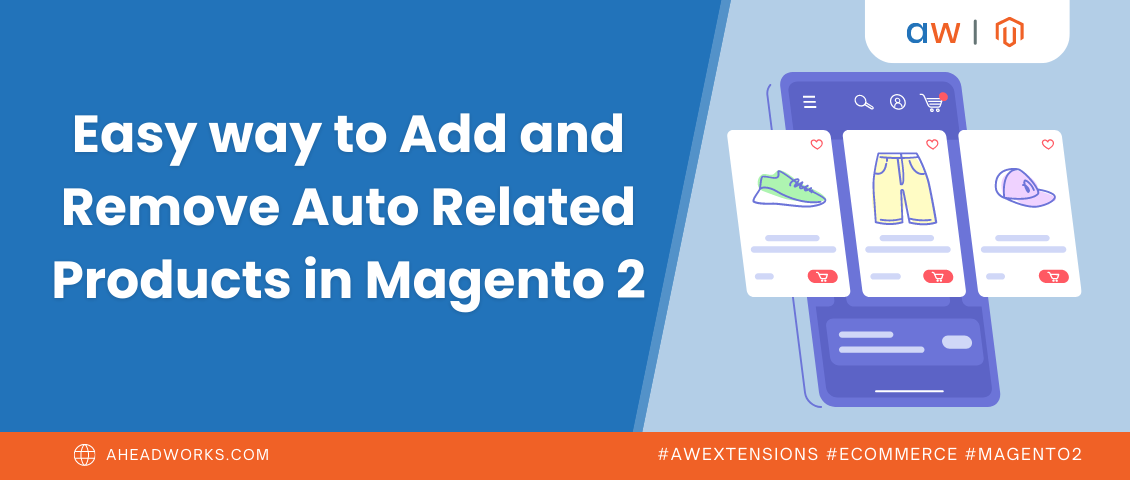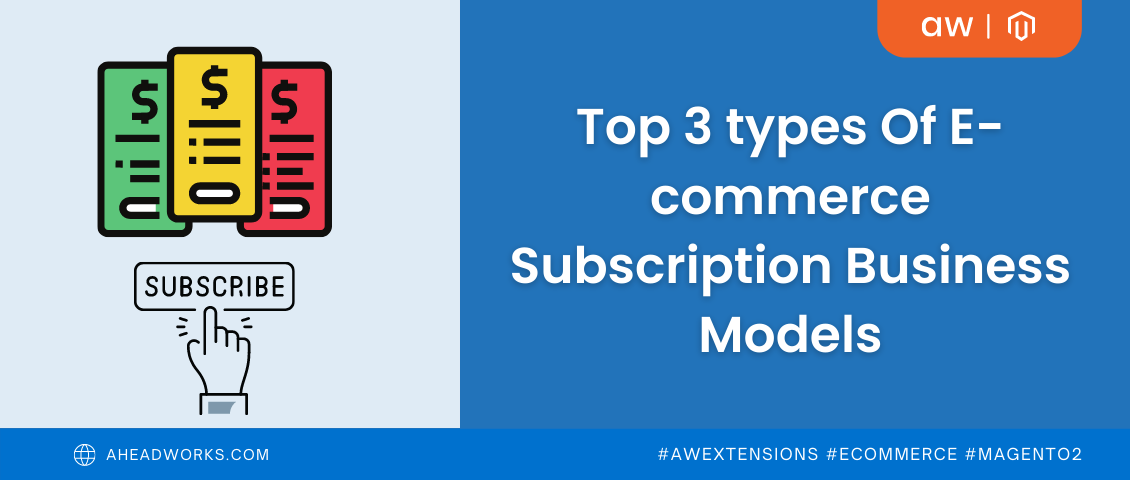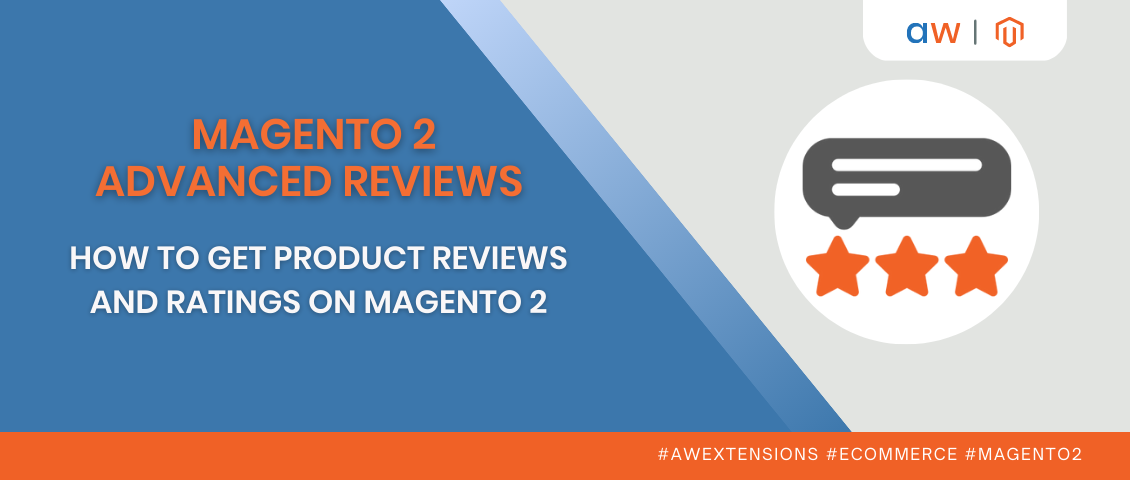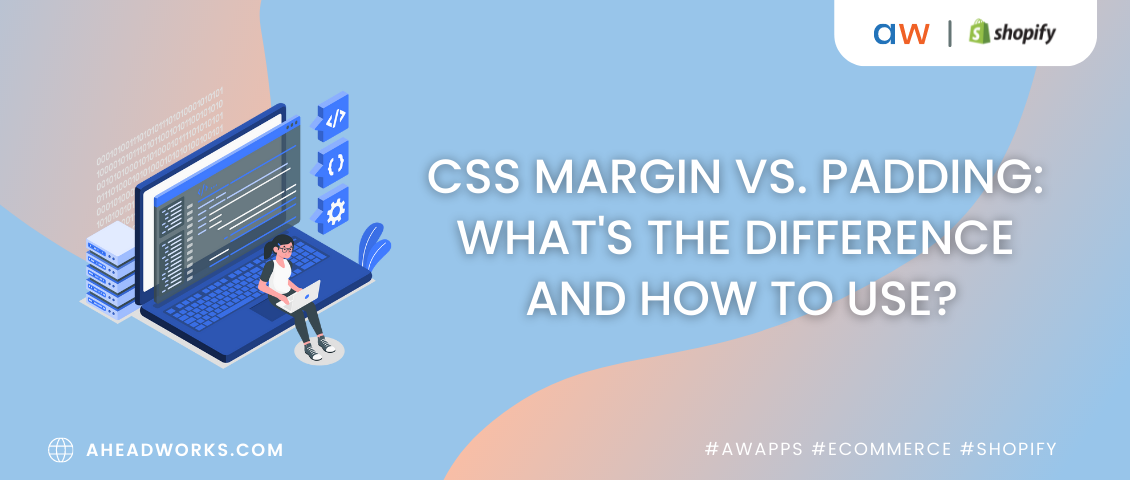
Magento is Great for B2B Ecommerce
Categorized as : Ecommerce
Ecommerce is an extremely changing environment and it constantly involves new industries and embraces new selling patterns and forms.
Started with online commercial documentation exchanges now ecommerce seems to be able to provide a sterling shopping experience for any commercial sphere, including B2B.

Although B2B is quite new in online sales its perspectives are estimated to be very promising. According to Forrester*, in 2019 the B2B ecommerce market is going to worth twice as much as the B2C one with the sales volume of $1.1 Trillion against $480 Billion.
The reasons shaping that booming growth are quite trivial and result from the aspiration of B2B buyers to save time and efforts. Just now, 74% of them discover half or more of their business purchases online before buying and 30% actually buy products there. But, this share is going to almost double in 2017 up to 56% making B2B sellers to struggle for that coveted prize*.
Since the competition in the B2B ecommerce segment becomes tough online store owners are ready to provide here only perfect shopping experience, comparable to the B2C segment. But, as far as B2B requires significantly different functionality, more complicated in most cases, the first coming question is to choose the best platform able to pave a highway from catalog to checkout perfectly suitable for B2B customers.
Despite the differences and specific features of any B2B businesses they often need quite similar things online. Perhaps, this fact explains the increasing number of enterprise commerce solutions used as online platforms for B2B sales. According to the Gorilla Group B2B Ecommerce Benchmarking report, the number of in-house platforms in use for the surveyed amount of web sites decreased in 2016 from 63% to 48% compared to 2015. The second half of web stores used Magento (19.23%), SAP-Hybris (7.69%), Netsuite (6.51%), and IBM Websphere (6.41%).
This significant shift to ecommerce platforms means that the existing B2B solutions suit current commercial needs, while the development of a new custom B2B project is too expensive and long.
Originally a B2C oriented ecommerce platform Magento was able to extend its functionality enough to compete on an equal footing with B2B designed products. Now it can offer all B2B required features and above gradually changing the B2B segment landscape.
Complex Pricing
Wholesale and manufacturing companies require more complex and advanced pricing, including individual and group discounts, tire and location-oriented prices, sales-volume based prices, etc. The above sellers are more flexible about pricing and need to take advantage of this benefit to the full.
Customer Login and Segmentation
Individual prices can be only ensured with the mandatory login process for customers and that’s why this functionality is indispensable for the B2B segment. Customer segmentation may also refer to particular shipping terms, additional services availability, order processing priority, etc.
Multiple Sales Representatives
Of course, those plentiful sales combined with an individual approach to each customer have to be fulfilled by multiple sales representatives simultaneously. These account managers can also have different roles and access permissions that need to be regulated by the corresponding backend functionality.
Search and Navigation
High-quality search and navigation facilities are equally important for both B2B and B2C segments. So, Magento is able to provide all necessary opportunities to make the process as intuitive and straightforward as possible.
Bulk Ordering
The ordering process is more complicated in B2B since it usually involves a lot of product items with numerous sizes, colors, weights, textures and so on and so forth. So, sellers need to carefully focus on that stage of purchases and provide customers with suitable bulk purchase functionality, including multi-attribute and multi-item product selection tools.
Re-ordering
Most wholesale buyers act as regular customers and often purchase constantly the same or at least quite similar sets of items. So, they will gladly take advantage of the subscription or some other similar functionality.
Order Approvals
As far as the inventory and price management is complicated, some B2B merchants have to approve orders manually before their processing. This is almost impossible in retail stores due to the overwhelming number of transactions that need to be inspected. So, it’s purely a B2B-related functionality requirement to be met by any ecommerce platform, including Magento.
Flexible Checkout Process
The checkout process also differs and usually is burdened with some additional conditions including customer credit limits, shipping restrictions, additional approvals, etc.
Multiple Devices and Screens
In addition to the specific functionality of the segment, B2B sellers operate as any other ecommerce units and have to follow all the best practices required in this business area. So, Magento-based stores are always mobile-friendly and look great on all devices due to its responsive templates.
Exceptional Customizability
And one more unbeaten advantage of Magento is its exceptional customizability enabling you to tailor your B2B store to all your business needs.
So, Magento perfectly complies with almost all the above B2B requirements and, combining both its native functionality and dedicated extensions, is ready to satisfy the needs imposed by the B2B segment to ecommerce platforms. Magento Enterprise Edition seems to be even more suitable for manufacturers and wholesalers as it contains many of the listed features by default.
The growing number of online B2B transactions and revenues does not mean that B2B ecommerce has entered the period of maturity. Some experts note that only few companies mostly or entirely generate their revenues online and the next few years are going to show whether B2B will move online completely or keep some off-line activities.
Anyway, in the nearest future a lot of B2B companies will need a reliable and highly functional B2B ecommerce platform to enter the online market, and Magento in this case is the option that is worth paying attention to.
References: Forrester Challenge Thinking. Lead Change. Latest Trends in B2B E-Commerce Strategies and Tech Investment.
Started with online commercial documentation exchanges now ecommerce seems to be able to provide a sterling shopping experience for any commercial sphere, including B2B.

B2B Ecommerce
Although B2B is quite new in online sales its perspectives are estimated to be very promising. According to Forrester*, in 2019 the B2B ecommerce market is going to worth twice as much as the B2C one with the sales volume of $1.1 Trillion against $480 Billion.
The reasons shaping that booming growth are quite trivial and result from the aspiration of B2B buyers to save time and efforts. Just now, 74% of them discover half or more of their business purchases online before buying and 30% actually buy products there. But, this share is going to almost double in 2017 up to 56% making B2B sellers to struggle for that coveted prize*.
Since the competition in the B2B ecommerce segment becomes tough online store owners are ready to provide here only perfect shopping experience, comparable to the B2C segment. But, as far as B2B requires significantly different functionality, more complicated in most cases, the first coming question is to choose the best platform able to pave a highway from catalog to checkout perfectly suitable for B2B customers.
Magento in B2B
Despite the differences and specific features of any B2B businesses they often need quite similar things online. Perhaps, this fact explains the increasing number of enterprise commerce solutions used as online platforms for B2B sales. According to the Gorilla Group B2B Ecommerce Benchmarking report, the number of in-house platforms in use for the surveyed amount of web sites decreased in 2016 from 63% to 48% compared to 2015. The second half of web stores used Magento (19.23%), SAP-Hybris (7.69%), Netsuite (6.51%), and IBM Websphere (6.41%).
This significant shift to ecommerce platforms means that the existing B2B solutions suit current commercial needs, while the development of a new custom B2B project is too expensive and long.
Magento B2B Functionality
Originally a B2C oriented ecommerce platform Magento was able to extend its functionality enough to compete on an equal footing with B2B designed products. Now it can offer all B2B required features and above gradually changing the B2B segment landscape.
Complex Pricing
Wholesale and manufacturing companies require more complex and advanced pricing, including individual and group discounts, tire and location-oriented prices, sales-volume based prices, etc. The above sellers are more flexible about pricing and need to take advantage of this benefit to the full.
Customer Login and Segmentation
Individual prices can be only ensured with the mandatory login process for customers and that’s why this functionality is indispensable for the B2B segment. Customer segmentation may also refer to particular shipping terms, additional services availability, order processing priority, etc.
Multiple Sales Representatives
Of course, those plentiful sales combined with an individual approach to each customer have to be fulfilled by multiple sales representatives simultaneously. These account managers can also have different roles and access permissions that need to be regulated by the corresponding backend functionality.
Search and Navigation
High-quality search and navigation facilities are equally important for both B2B and B2C segments. So, Magento is able to provide all necessary opportunities to make the process as intuitive and straightforward as possible.
Bulk Ordering
The ordering process is more complicated in B2B since it usually involves a lot of product items with numerous sizes, colors, weights, textures and so on and so forth. So, sellers need to carefully focus on that stage of purchases and provide customers with suitable bulk purchase functionality, including multi-attribute and multi-item product selection tools.
Re-ordering
Most wholesale buyers act as regular customers and often purchase constantly the same or at least quite similar sets of items. So, they will gladly take advantage of the subscription or some other similar functionality.
Order Approvals
As far as the inventory and price management is complicated, some B2B merchants have to approve orders manually before their processing. This is almost impossible in retail stores due to the overwhelming number of transactions that need to be inspected. So, it’s purely a B2B-related functionality requirement to be met by any ecommerce platform, including Magento.
Flexible Checkout Process
The checkout process also differs and usually is burdened with some additional conditions including customer credit limits, shipping restrictions, additional approvals, etc.
Multiple Devices and Screens
In addition to the specific functionality of the segment, B2B sellers operate as any other ecommerce units and have to follow all the best practices required in this business area. So, Magento-based stores are always mobile-friendly and look great on all devices due to its responsive templates.
Exceptional Customizability
And one more unbeaten advantage of Magento is its exceptional customizability enabling you to tailor your B2B store to all your business needs.
So, Magento perfectly complies with almost all the above B2B requirements and, combining both its native functionality and dedicated extensions, is ready to satisfy the needs imposed by the B2B segment to ecommerce platforms. Magento Enterprise Edition seems to be even more suitable for manufacturers and wholesalers as it contains many of the listed features by default.
Conclusion
The growing number of online B2B transactions and revenues does not mean that B2B ecommerce has entered the period of maturity. Some experts note that only few companies mostly or entirely generate their revenues online and the next few years are going to show whether B2B will move online completely or keep some off-line activities.
Anyway, in the nearest future a lot of B2B companies will need a reliable and highly functional B2B ecommerce platform to enter the online market, and Magento in this case is the option that is worth paying attention to.
References: Forrester Challenge Thinking. Lead Change. Latest Trends in B2B E-Commerce Strategies and Tech Investment.




